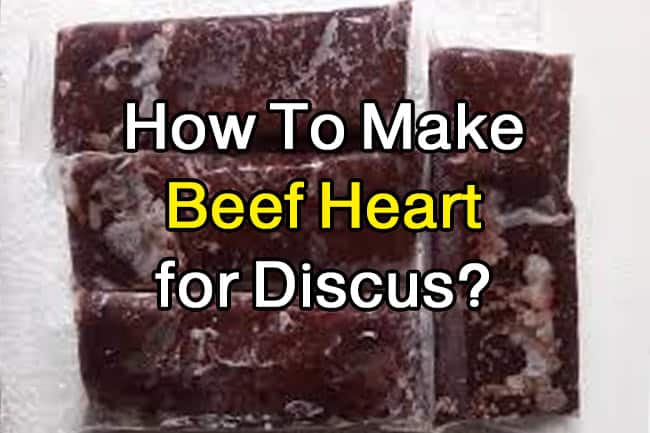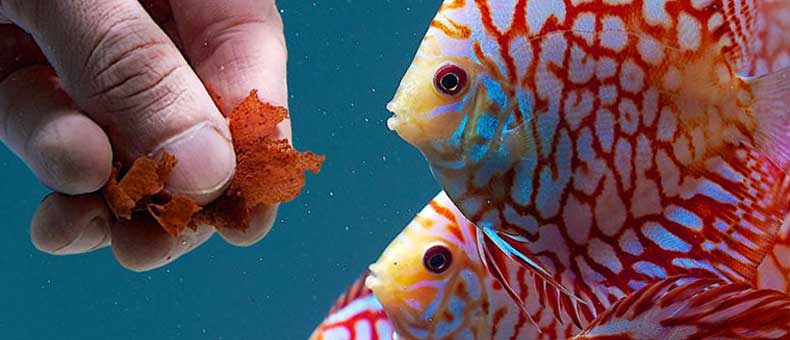
Table of Contents
- Why Do Discus Spit Out Food?
- What Do Discus Eat?
- What Do Wild Discus Eat?
- What Are Frozen Bloodworms?
- How To Feed My Discus Frozen Bloodworms?
- Is Bloodworm Good For Discus?
- Can Discus Eat Flakes?
- How Much Should I Feed My Discus?
- What Is The Best Food For Discus?
- Will Discus Eat Neon Tetras?
Why Do Discus Spit Out Food?
Discus normally spits out the food because they don’t have teeth rather they have grinders in the jaw and that is why your Discus might be spitting food out and taking it in again in order to chew it properly.
In some rare cases, Discus might be spitting out food because of some type of parasite infection so in this case, the best thing to do is to treat for parasites just in case as a precaution.
What Do Discus Eat?
Normally, Discus fish likes to eat meaty meals such as bloodworms, earthworms, and mosquito larvae as well as eating a significant quantity of plant material. Frozen foods and live foods are also used to feed Discus.
You should look forward to providing a healthy diet that usually is a combination of more than one food type.
What Do Wild Discus Eat?
In the wild, Discus fish essentially forage on zooplankton, insects, and invertebrates. Plant matter can also be used to feed wild Discus but in rare cases, that’s why Discus is unlikely to damage live aquarium plants in captivity.
Discus fish cannot bear large portions of food due to the compressed structure of their bodies, thus overfeeding is a vital concern for captive Discus fish.
What Are Frozen Bloodworms?
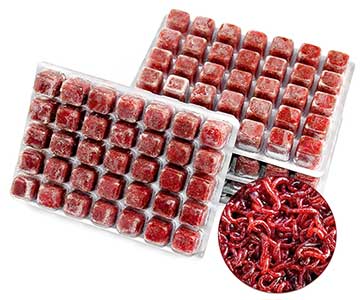
Bloodworms refer to a few different types of worm; mainly the small red larvae from mosquito flies (Chironomidae) and the genus (Glycera), bloodworms that are the larvae of the non-biting midge fly are bright red in color.
How To Feed My Discus Frozen Bloodworms?
When you are ready to feed your Discus fish, fill a small container with some of the tank water and place a cube of bloodworms in, to thaw it out. Once it has thawed, strain the defrosted food to remove the water and excess juices and then feed it to your Discus.
Frozen bloodworms are more convenient than live foods as they can be preserved frozen for up to 6 months.
Is Bloodworm Good For Discus?
Indeed, live bloodworms are very beneficial for feeding Discus. feeding your Discus bloodworms will majorly reduce the risk of parasites infections and the occurrence of any disease also becomes very unlikely compared to feeding wild bloodworms.
If you are willing to use live bloodworms then find a person with a culture that is clean.
Can Discus Eat Flakes?
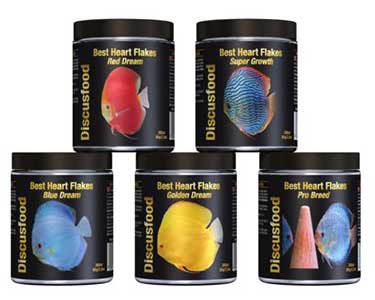
Yes, flakes are consumed by Discus but they should not be the focus of their feeding plans. Beef Heart Flakes is a staple food flake having a well-balanced composition of nutrients.
One of the features in the composition is the protein in cattle’s hearts. It does not decompose when fed, nor does it cloud the water, in addition, the flake offers much higher nutritional value than the frozen cattle heart, and it is not subject to any cold chain, much better to feed and space-saving to store.
How Much Should I Feed My Discus?
A decent measure of feeding your fish is to provide the food that is 3% of their body weight. Feeding depends on the maturity of the fish. If the fish is younger, then they should be fed up to 3 times per day and if the fish is adult then it should be fed twice a day.
Overfeeding is even harmful to our Discus as this may lead to improper fishbone’s growth. This can even cause a shorter operculum or a bent backbone.
What Is The Best Food For Discus?
Beefheart is the best food for Discus fish as well as any diet that includes meat as they are carnivorous by nature such as bloodworms, earthworms, and mosquito larvae are some of the favorite food of the Discus fish. However, fish flakes, pellets, and frozen food can also be used to feed Discus.
The most popular food type among Discus keepers is the beef heart, which usually comes in its frozen form. It is the best diet for the growth of your Discus.
For further details on how to prepare the best Beefheart homemade, refer to the below article, or you can refer to my article 11 Best food for Discus – What is the best food for Discus?
Will Discus Eat Neon Tetras?
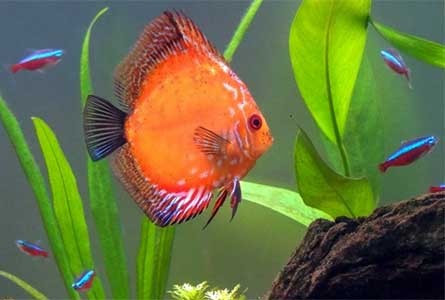
No, Discus will not eat neon tetras as long as neon tetras size is big enough compared to Discus mouth, they both can live along. Discus may eat smaller fish on occasion, but they won’t make a habit out of it.
Discus fish are relatively larger in size than neon tetras so there is every possibility that Discus can eat neon tetras. In spite of this threat, we should also consider the fast swimming of tetras, their size and agility.
Neon tetras are suitable companions for Discus fish despite being so tiny because they are also peaceful and social. They usually get along with other types of fish.

